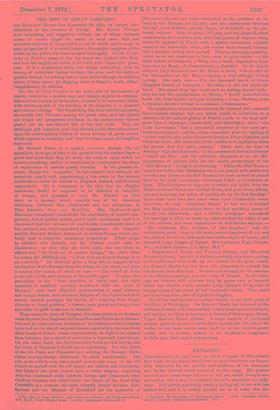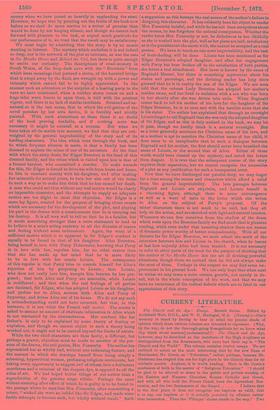EXPIATED.*
REMEMBERING the high terms in which we spoke of this author's first work, we are almost afraid that we must have been too favour- ably impressed by the novelty and freshness of his treatment and by the interest which attached to the story. His present novel is in so many ways inferior to the one which brought him into notice, that it may be necessary for us to reconsider our judg- ment. It is always painful to detect a falling-off in one who has started well, and it is doubly painful for us to make this dis-
* Expiated. By the Author of "Six Months Hence." 3 vols. Salisbury: Brown and Co.; London: Simpkin and MarshalL 1872.
covery when we have joined so heartily in applauding the start. However, we hope that by pointing out the faults of the book now before us we shall do more service to a writer of promise than would be done by our keeping silence, and though we cannot look forward with pleasure to the task, or expect much gratitude for our performance of it, we trust that the result may be satisfactory.
We must begin by admitting that the story is by no means wanting in interest. The mystery which underlies it is not indeed so deep, nor is the network of the plot so intricate, as was the case in Six Months Hence and Behind the Veil, but there is quite enough to excite our curiosity. The descriptions of coast-scenery in -South Wales, of the deep dark cave with the "Blowhole" from which issue moanings that portend a storm, of the haunted bridge that is swept away by the flood, are wrought up with a power and intensity which cannot fail to be highly appreciated. In like manner such an adventure as the surprise of a boating party in the cave we have mentioned, when a sudden storm comes on and a huge tidal wave bursts in upon them, is told with the greatest vigour, and there is no lack of similar incidents. Strained and un- natural as is the last scene, that in which the evil genius of the novel perishes by her own device, it is forcibly and vividly painted. With such attractions as these there is no doubt of the book proving readable, and if nothing more was necessary it might be counted as a success. But when we have taken all its merits into account, we find that they are out- weighed by the general improbability of the story and of its leading characters. The idea which runs through the book, and to which frequent allusion is made, is that a family has been doomed to expiate the crime of one of its ancestors. At the time with which the story deals, Sir Edgar Brereton is the head of this -doomed family, and the crime which is visited upon him is that of a former baronet, who committed a murder. To make amends for this, Sir Edgar is forced to drive his wife from house and home, to live in constaut enmity with his daughter, and after making her miserable for several years, to turn her also out of the house in such a way as to make him think that he has caused her death. A man who could act thus without any real motive would be clearly an impossible character, and the attempts to supply an adequate motive are too slight to meet this objection. Sir Edgar is a snere lay figure, created for the purpose of bringing about events which are necessary for the development of the plot, and playing his part in the drama with a consciousness that he is carrying out his destiny. It i2 all very well to tell us that he is a fatalist, but it needs something stronger than a mere statement to lead us to believe in a man's acting contrary to all the dictates of reason -and feeling without some inducement. Again, the want of a sufficient motive which is so apparent in Sir Edgar's conduct is equally to be found in that of his daughter. Alice Brereton, being herself in love with Percy Delaconabe, knowing that Percy is in love with her, repulses him, for no other reason than that she has made up her mind that he is more likely to be in love with her cousin Leonie. The consequence of this repulse is that Percy tries to console himself for Alice's rejection of him by proposing to Louie ; that L6onie, who does not really love him, accepts him because he has pro- posed ; that both Alice and Percy are miserable, while L6onie is indifferent ; and that when the real feelings of all parties are disclosed, Sir Edgar, who has adopted Leonie as his daughter, and prefers her to Alice, accuses both Alice and Percy of hypocrisy, and drives Alice out of his house. We do not say such a misunderstanding could not have occurred, but that, in this instance, it is not what the French call motive. The reader is asked to assume an amount of obstinate infatuation in Alice which is not warranted by the circumstances. Her conduct, like her father's, is only to be explained by some theory of destiny or expiation, and though we cannot object to such a theory being worked out, it ought not to be carried beyond the limits of nature.
While the two chief characters are thus faulty, a different, but perhaps a graver, objection must be made to another of the per- sons of the drama, the evil genius, Mrs. Ponsonby. The author has represented her as wholly bad, without one redeeming feature, and the manner in which she develops herself from being simply a scheming, hypocritical woman, professing religious sentiments, but taking every opportunity to suggest evil of others, into a deliberate murderess and a criminal of the deepest dye, is opposed to all the rules of art. We had hoped better things of our author than a reproduction of the genuine stage villain. Perhaps the most violent straining after effect of which he is guilty is to be found in the passage where he says that Mrs. Ponsonby, after committing a crime, "wished she were an infidel like Sir Edgar, and made some feeble attempts to become such, but wholly without result." Such a suggestion as this betrays the real source of the author's failure in designing this character. It has evidently been his object to render Mrs. Ponsonby hateful, and while he has not been scrupulous about the means, he has forgotten the natural consequence. Whether the reader hates Mrs. Ponsonby or not, he disbelieves in her. Skilfully as she is worked into the plot, well as her plans are laid, satisfactory as is the punishment she meets with, she cannot be accepted as areal person. We have to touch on one more improbability, and the task of fault-finding will be done. L6onie has been mentioned as Sir Edgar Brereton's adopted daughter, and after her engagement with Percy has been broken off to the satisfaction of both parties, she forms a real attachment. Her lover is known by the name of Reginald Manse], but there is something mysterious about his status and parentage, and the divining reader has long since guessed that he is in reality the son of Sir Edgar. We are soon told that the outcast Lady Brereton has adopted her mother's maiden name, and has lived in seclusion with a son who was born to her shortly after she was driven into exile. When Reginald comes back to tell his mother of his love for the daughter of Sir Edgar Brereton, he is at once met with the terrible news that she is his sister. The author has explained that through an oversight L6onie forgot to tell Reginald that she was only the adopted daughter of Sir Edgar, and as this is duly noticed in the book, we may let it pass, though we hardly think it a natural oversight. But as a lover generally mentions the Christian name of his love, and as a mother is apt to mention the Christian name of her child, it does seem to us inexplicable that in such a dialogue between Reginald and his mother, the first should never have breathed the name of Laonie, or the second that of Alice. Either of those words would have cleared up the mystery, and saved the lovers from despair. It is true that the subsequent course of the story requires their separation, but we cannot recognise the necessities of a plot as any justification for such a transparent error.
Now that we have discharged our painful duty, we may linger for a time among the scenes and characters which afford a relief from the general improbability. The love passages between Reginald and Leonie are exquisite, and L6onie herself is a charming figure, although there is some extravagance as well as a want of taste in the letter which she writes to Alice on the subject of Percy's proposal. Of the minor characters there is not much to be said, but they all help on the action, and are sketched with light and natural touches. Whenever we can free ourselves from the shadow of the doom which rests upon the Brereton family we find much that is pleasant reading, while even under that haunting shadow there are scenes of dramatic power worthy of better companionship. With all our distaste for Sir Edgar Brereton, we must admit the merit of the interview between him and Leonie in the church, when he learns at last how unjustly Alice had been treated. It is not necessary to refer to other parts of the book for the purpose of showing that the author of Six Months Hence has the art of devising powerful situations, though there we noticed that he did not always make the most of them. Perhaps in this respect we may find some im- provement in his present book. We can only hope that when next he writes we may trace a more certain growth, not merely in de- tail, but in the whole conception of his work, and that we may have no recurrence of the radical defects which are so fatal to our appreciation of this story.



































 Previous page
Previous page